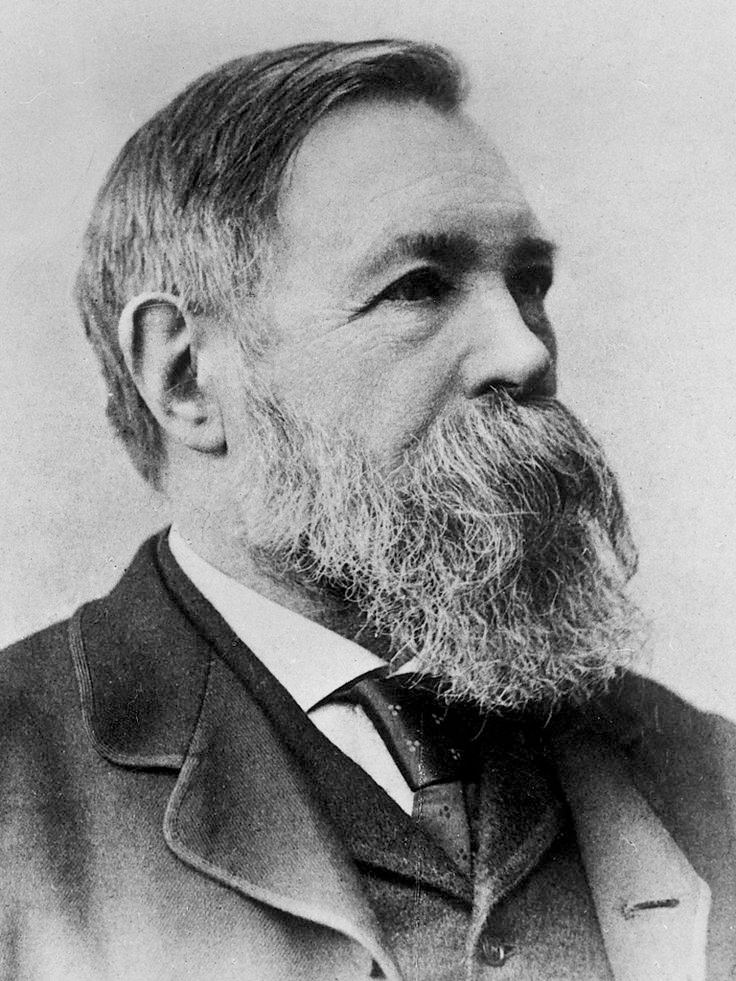Engels, Frederick, socialist, born in Barmen on Nov. 28, 1820, the son of a well-to-do manufacturer. Took up commerce, but already at an early age began propagating radical and socialist ideas in newspaper articles and speeches. After working for some time as a clerk in Bremen and serving for one year as an army volunteer in Berlin in 1842, he went for two years to Manchester, where his father was co-owner of a cotton mill.
In 1844 he worked for the Deutsch-Französische Jahrbücher published by Arnold Ruge and Karl Marx in Paris. In 1844 he returned to Barmen and in 1845 addressed communist meetings organised by Moses Hess and Gustav K?ttgen in Elberfeld. Then, until 1848, he lived alternately in Brussels and Paris; in 1846 he joined, with Marx, the secret Communist League, a predecessor of the International, and represented the Paris communities at the two League congresses in London in 1847. On the League's instructions, he wrote, jointly with Marx, the Communist Manifesto addressed to the "working men of all countries", which was published shortly before the February revolution [1848] (a new edition appeared in Leipzig in 1872).
In 1848 and 1849 E. worked in Cologne for the Neue Rheinische Zeitung edited by Marx, and after its suppression he contributed, in 1850, to the Politisch-oekonomische Revue. He witnessed the uprisings in Elberfeld, the Palatinate and Baden and took part in the Baden-Palatinate campaign as aide-de-camp in Willich's volunteer corps. After the suppression of the Baden uprising E. returned as a refugee to England and re-entered his father's firm in Manchester in 1850.
He retired from business in 1869 and has lived in London since 1870. He assisted his friend Marx in providing support for the international labour movement, which arose in 1864, and in carrying on social-democratic propaganda. E. was Secretary for Italy, Spain and Portugal on the General Council of the International. He advocates Marxian communism in opposition to both "petty bourgeois" Proudhonist and nihilistic Bakuninist anarchism. His main work is The Condition of the Working-Class in England (Leipzig, 1845; new edition, Stuttgart, 1892), which, although one-sided, possesses undeniable scientific value. His Anti-Dühring is a polemic of considerable size (2nd ed. Zurich, 1886). E.'s other published works include Ludwig Feuerbach and the End of Classical German Philosophy (Stuttgart, 1888), The Origin of the Family Socialism: Utopian and Scientific (4th ed., Berlin, 1891). E. also published Vols 2 and 3 of Karl Marx's Capital and the 3rd and 4th editions of Vol. I, and contributed many articles to the Neue Zeit.
Megathreads and spaces to hang out:
- ❤️ Come listen to music and Watch movies with your fellow Hexbears nerd, in Cy.tube
- 💖 Come talk in the New Weekly Queer thread
- 💛 Read and talk about a current topics in the News Megathread
- 💚 Come and talk in the Daily Bloomer Thread
- ⭐️ September Movie Nominations ⭐️
reminders:
- 💚 You nerds can join specific comms to see posts about all sorts of topics
- 💙 Hexbear’s algorithm prioritizes comments over upbears
- 💜 Sorting by new you nerd
- 🌈 If you ever want to make your own megathread, you can reserve a spot here nerd
- 🐶 Join the unofficial Hexbear-adjacent Mastodon instance toots.matapacos.dog
Links To Resources (Aid and Theory):
Aid:
Theory:



Been watching Invincible, the only cape show I've been able to get into. I guess I like the whole "Evil Superman and his consequences" thing.
I'm not sure how I feel about how the Viltrumites are portrayed. They run a star empire and they kill the shit out of people to build it, but the only thing we've been told about their politics is that they're sort of into eugenics. The weirdest thing about them is that they apparently don't have much of an imperial program. With real empires, there's a push for resources, people on the imperial periphery get caught in a cycle of poverty and unequal exchange, and so on - but apparently the Viltrumites just want to take over so that they can install their own utopian post scarcity space society on everyone else. I like that it's explicitly the opposite of how Superman was told to help people without doing Kryptonian colonialism, but it feels like the authors didn't fully understand why empires are bad.
It's portrayed as a bad thing, but purely in an abstract sort of way. It's bad that they use violence to conquer other planets, it's bad that they force people to bow to them or whatever - but once the puppet regime is in place every single planet that we've seen seems to thrive under their leadership. Their history is even a tacit endorsement of eugenics, since they apparently "purged" their way to being the strongest species in the universe, when if you wanted to condemn eugenics they should have "purged" their way into being an entire species of Hapsburgs. idk maybe there's something the show hasn't gotten to yet where we learn that the planets only look nice on the surface, but in the meantime it kinda leaves a bad taste in my mouth.
Plus I keep waiting for Eve to read the Communist Manifesto and start disintegrating billionaires.
If you like the whole "Evil Superman and his consequences" thing also try The Boys